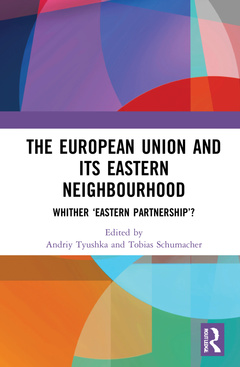Description
The European Union and Its Eastern Neighbourhood
Whither ‘Eastern Partnership’?
Coordinators: Tyushka Andriy, Schumacher Tobias
Language: English
Subject for The European Union and Its Eastern Neighbourhood:
Keywords
Eastern Partnership; Eastern Partnership Countries; Eurasian Economic Union; EEU; EU’s Eastern Neighbor; EU Policy; EU Russia Relation; VLAP; Public Administration; EU Ukraine Relation; Eurasian Integration; EU Member State; EU’s Foreign Policy; post-Soviet Space; Civil Society; EU’s Approach; EaP Summit; EU's Eastern Partnership; Eurasian Project; EU’s Internal Market; EU Democratic Conditionality; Bargaining Power Model; Democratic Conditionality; EU Actorness; EU’s Ability
Publication date: 09-2023
· 17.4x24.6 cm · Paperback
Publication date: 11-2021
· 17.4x24.6 cm · Hardback
Description
/li>Contents
/li>Readership
/li>Biography
/li>
This edited volume brings together some of the most important scholarly perspectives ? in the form of both journal article reprints and original contributions ? on the structure and dynamics of the EU?s multi-layered relations with its Eastern neighbours within the Eastern Partnership (EaP) framework and beyond.
In May 2019, the EU?s EaP ? an ambitious and sophisticated policy framework, conjoining elements of cooperation and integration, with the EU?s six eastern neighbours, i.e. Ukraine, Belarus, Moldova, Georgia, Armenia and Azerbaijan ? turned ten years. This anniversary, in conjunction with repeatedly voiced critique by scholars and policy-makers alike regarding the framework?s effectiveness and utility, led the EU to submit the EaP to a fundamental auditing and revision.
Structured around both enduring and emerging issues in the broader EU-Eastern neighbourhood framework, this book provides a retrospective analysis of key structural and relational challenges, unfolding regional dynamics, distinctive forms of bilateral/multilateral engagement, whilst also offering a critical perspective on the contested future relations between the EU and its Eastern neighbours. Looking backwards and providing a critical and thorough assessment of the first ten years of the EaP in practice, this book thinks forward and gauges its many potential future avenues. This comes at a crucial moment, as the EU and its six Eastern neighbours are in search of new and mutually acceptable forms of association.
Preface
Kathariná Mathernová
Introduction:The European Union, its Eastern Neighbourhood and an Evolving Structured Engagement within and beyond the Eastern Partnership Framework
Tobias Schumacher
Part I: The EU’s Eastern Partnership and Regional Dynamics: Enduring Issues and Contending Perspectives
1. The European Union’s ‘Ideal Self’ in the Post-Soviet Space
Cristian Nitoiu
2. Between the Eastern Partnership and Eurasian Integration: Explaining Post-Soviet Countries’ Engagement in (Competing) Region-Building Projects
Laure Delcour
3. "The transformative power of Europe" beyond enlargement: the EU’s performance in promoting democracy in its neighbourhood
Tanja A. Börzel and Bidzina Lebanidze
4. The Geopoliticisation of the EU’s Eastern Partnership
David Cadier
5. The Unintended Consequences of a European Neighbourhood Policy without Russia
Tom Casier
6. Bringing "the political" back into European security: challenges to the EU’s ordering of the Eastern Partnership
Liciìnia SimaÞo
Part II:The EU’s Bilateral Engagement with Eastern Neighbours: A Growing Menu of Choice
7. State building and European integration in Ukraine
Kataryna Wolczuk
8. When Goliath meets Goliath: how Russia and the EU created a vicious circle of instability in Moldova
Ryhor Nizhnikau
9. The Politics of Flexibility: Exploring the Contested Statehood–EU Actorness Nexus in Georgia
Madalina Dobrescu and Tobias Schumacher
10. Armenia and Belarus: caught between the EU’s and Russia’s conditionalities?
Alena Vieira and Syuzanna Vasilyan
11. The European Union and Belarus: democracy promotion by technocratic means?
Elena A. Korosteleva
12. From ‘Unilateral’ to ‘Dialogical’: Determinants of EU–Azerbaijan Negotiations
Eske van Gils
Part III: Looking Backward: The EU, the Eastern Neighbours and the ‘Eastern Partnership’ a Decade Past
13. Looking Backward: Deliverables and Drawbacks of the Eastern Partnership during 2009-2020
Andriy Tyushka and Tobias Schumacher
Conclusion: The EU and its Eastern Neighbourhood – whither ‘Eastern Partnership’?
Andriy Tyushka
Annexes
Annex 1. Content Analysing the Joint Declarations of the Eastern Partnership Summits in 2009-2017
Annex 2. Studying EU-Eastern Neighbours Relations Within and Beyond the Eastern Partnership in 2009-2020: A Bibliometric Perspective
Andriy Tyushka is Senior Research Fellow in the European Neighbourhood Policy Chair at the College of Europe in Natolin, Poland. He published widely on IR theory, European security and EU foreign policy. His latest book publication is the co-edited volume States, International Organizations, and Strategic Partnerships (Edward Elgar, 2019).
Tobias Schumacher is Professor of International Relations and Chairholder of the European Neighbourhood Policy Chair at the College of Europe, Natolin campus (Warsaw) and Associate Professor in European Studies at the Department of Historical and Classical Studies (IHK) at the Norwegian University of Science and Technology (NTNU), Trondheim. He is the lead editor of The Routledge Handbook on the European Neighbourhood Policy (2018), and his articles have appeared in journals such as Journal of Common Market Studies, Geopolitics, Democratization, Mediterranean Politics, European Security, Contemporary Politics, Global Discourse, and others.




